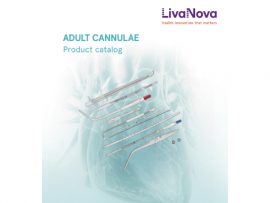Abstract Mobilization of patients supported on extracorporeal membrane oxygenation (ECMO)—especially with femoral cannulas—presents unique challenges. This single-center retrospective cohort study aims to assess the efficacy and safety of mobilizing these..
Read MorePrevalence and Predictors of 3 Vital Outcomes After Venoarterial Extracorporeal Membrane Oxygenation
Abstract Background Predictors of death resulting from extracorporeal membrane oxygenation (ECMO) withdrawal, in-hospital death after ECMO liberation, and survival to hospital discharge have been evaluated incompletely, despite the prognostic insight..
Read MoreAbstract Cardiovascular collapse and arrest in the periprocedural setting and intensive care unit differ from arrests in other contexts (such as out-of-hospital or hospital ward) because clinicians almost always witness..
Read MoreAbstract Extracorporeal carbon dioxide removal (ECCO₂R) prevents intubation and facilitates extubation in patients with hypercapnic respiratory failure. However, low-flow systems increase shear stress and need full anticoagulation, increasing the risk..
Read MoreAbstract Objective: To characterize the variability in venovenous extracorporeal membrane oxygenation (VV-ECMO) candidacy decision-making processes across international Extracorporeal Life Support Organization (ELSO) member institutions. Design: An international survey study of..
Read MoreAbstract Background Evidence on prophylactic venoarterial extracorporeal membrane oxygenation (VA-ECMO) during elective percutaneous coronary intervention (PCI) in patients with complex high-risk coronary artery lesions is limited. Objectives The authors aimed..
Read MoreAbstract This referral center’s prospective inception-cohort study from 1989 to 2000 (Era 1) and 2000 to 2022 (Era 2) included 232 consecutive children having neonatal respiratory extracorporeal membrane oxygenation (ECMO)...
Read MoreAbstract Pumping blood through an extracorporeal membrane oxygenation (ECMO) circuit in critically ill patients inevitably leads to a pathophysiological response characterized by platelet and procoagulant activation, fibrin deposition, and immunomodulation. This..
Read MoreAbstract OBJECTIVES: To evaluate the relationship between the duration of pre-extracorporeal membrane oxygenation (ECMO) mechanical ventilation and mortality in acute respiratory distress syndrome (ARDS) patients undergoing venovenous ECMO. DESIGN: Retrospective..
Read MoreAbstract Background Venoarterial extracorporeal membrane oxygenation (VA-ECMO) is a life-saving mechanical support in patients with cardiogenic shock. There are great variations in the reported rates of neurological complications and associated..
Read MoreAbstract Background Intravenous calcium is frequently administered in cardiac surgery patients to improve hemodynamics. Objectives To assess safety and efficacy of intravenous calcium administration in this population. Methods We conducted..
Read MoreAbstract Mitral regurgitation (MR) in lung transplant (LTx) recipients is a rare but complex cardiopulmonary phenomenon. The overlap between symptoms of MR and post-LTx complications, such as primary graft dysfunction,..
Read MoreAbstract Objectives: To report on 5-year survival, health-related quality of life (HRQoL), and occupational status of patients with respiratory or cardiac failure, who were supported with extracorporeal membrane oxygenation (ECMO)...
Read MoreAbstract Background The increasing prevalence of end-stage heart failure coupled with limited donor organs creates a critical need for novel strategies in heart transplantation. Donation after circulatory death offers a..
Read MoreAbstract Background Acute kidney injury (AKI) is a frequent complication following cardiac surgery involving cardiopulmonary bypass (CPB). This is partly attributable to crystalloid-based priming solutions causing both hemolysis and loss..
Read MoreAbstract Objective To construct a nomogram prediction model for death in patients with cardiogenic shock after extracorporeal membrane oxygenation (ECMO) weaning. Methods Totally 210 patients with cardiogenic shock treated with..
Read MoreAbstract Advances in cardiovascular disease prevention are often hailed as one of the major public health accomplishments of the past 50 years. The progress achieved is rooted in efforts challenging..
Read MoreAbstract Objectives Maintaining a nadir oxygen delivery ≥ 280 mL/min/m2 during cardiopulmonary bypass is a pillar of the goal-directed perfusion strategy in cardiac surgery. However, there are patients who develop a..
Read MoreAbstract Background: The use of temporary mechanical circulatory support (tMCS) has revolutionized the management of cardiogenic shock (CS). However, standardized readiness-to-explant criteria for venoarterial extracorporeal membrane oxygenation (VA-ECMO) have not been..
Read MoreAbstract Objective To explore the factors affecting patient outcomes in pulmonary artery thromboendarterectomy (PTE) under deep hypothermic circulatory arrest (DHCA) and cardiopulmonary bypass (CPB) support and to provide a reference..
Read MoreScientific Explanation of Tetralogy of Fallot With Pulmonary Atresia and the Therapeutic Role of Dr. Sam Zeraatian-Nejad Davani 1. Introduction to the Disease: Tetralogy of Fallot (TOF) Tetralogy of Fallot..
Read MoreAbstract Lightning strike injuries have a high mortality rate and frequently result in immediate cardiac arrest. Although extracorporeal cardiopulmonary resuscitation (ECPR) is increasingly used for out-of-hospital cardiac arrest, its role..
Read MoreAbstract Objectives Maintaining a nadir oxygen delivery ≥ 280 mL/min/m2 during cardiopulmonary bypass is a pillar of the goal-directed perfusion strategy in cardiac surgery. However, there are patients who develop a..
Read MoreAbstract Objectives Minimal invasive Extracorporeal Circulation (MiECC) and Hybrid System (HS) have been introduced to potentially reduce the inflammatory response compared to conventional Cardiopulmonary Bypass (cCPB). The HS combines elements..
Read MoreAbstract As survival among patients with congenital heart disease (CHD) continues to improve, the population of adults with CHD (ACHD) is rapidly growing. These patients often present with complex anatomy,..
Read MoreAbstract Background Although extracorporeal cardiopulmonary resuscitation (ECPR) has shown promise for refractory out-of-hospital cardiac arrest (CA), limited data exist regarding its application in cases involving severe primary blast lung injury..
Read MoreAbstract Objective Postoperative cardiac dysfunction and arrhythmias are significant complications following cardiac surgery, frequently resulting in increased mortality, longer hospital stays, higher healthcare costs, and diminished patient quality of life...
Read MoreAbstract Introduction Cardiopulmonary bypass (CPB) plays a central role in pediatric cardiac surgery, yet standardized quality indicators (QIs) specific to pediatric practice remain underutilized across institutions. Methods A comprehensive review..
Read MoreAbstract To evaluate a novel anticoagulation strategy in an extracorporeal circuit, we introduce a device that induces local hypothermia as blood flows through the circuit. Using a pig model, we..
Read MoreAbstract Background/Objectives: Mechanical circulatory support (MCS) is increasingly utilized for the management of acute decompensated heart failure (HF) and cardiogenic shock (CS). The primary goals of MCS are to restore systemic..
Read More


















